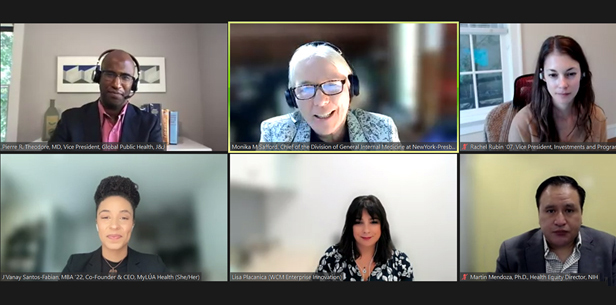
In celebration of diversity month, Enterprise Innovation’s CTL at Weill Cornell addressed disparities in health and health care affecting underrepresented groups in a special panel on Oct. 11 consisting of experts from academia, industry, government and investment.
Gender, ethnic and racial backgrounds, income, housing and geographic location are some of the factors that influence health and well-being. People of color and other marginalized groups are the most impacted by health care inequity, and they experience higher rates of illness. Racial disparities alone are estimated to cost $93 billion in excess medical care.
In addition to providing insights on the current state of health care, panelists discussed how innovations can drive health outcomes (e.g., equitable access to care, diversification of clinical trials, etc.) and the existing programs that can sustainably mitigate health disparities through commercialization and investment.
Innovators as diverse as the communities they serve are developing needed innovations to advance health equity for all. Health technology can play a strong role in low-income environments, whether it is local or global. As panelist Dr. Pierre Theodore pointed out, inequities are often experienced locally and solved locally; however, it is also important to think broadly and develop models that in turn can impact health disparities on a broader scale.
Special Thanks to the Panelists
• Martin Mendoza, Ph.D., Health Equity Director, The National Institutes of Health
• Rachel Rubin, B.S. ’07, Vice President, Investments and Programs, Roivant Social Ventures
• Monika Safford, M.D., John J. Kuiper Professor of Medicine, Weill Cornell Medicine
• J'Vanay Santos-Fabian, MBA ’22, Co-Founder and Chief Executive Officer, My LÚA
• Pierre R. Theodore, M.D., Vice President of Global Public Health, Johnson & Johnson

